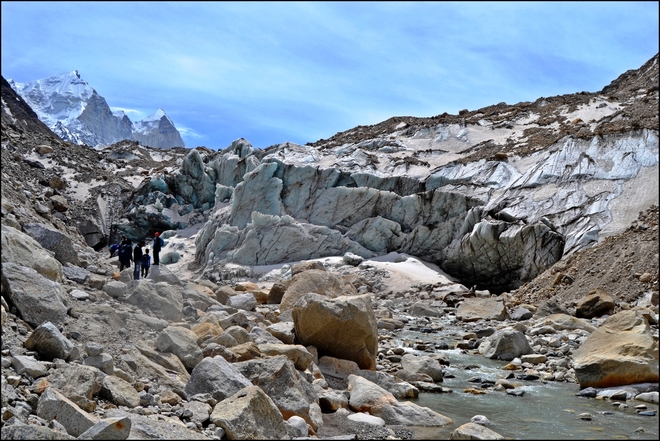
Experts say in the past one century, several Himalayan glaciers, including Gaumukh Glacier (pic), have receded substantially.
Tribune News Service
Dehradun, October 9
DP Dobhal, a senior scientist of the Wadia Institute of Himalayan Geology (WIHG), has expressed concern at speedy receding of glaciers in the Himalayan region.
Dobhal was addressing a workshop on ‘Himalayan ecosystem, challenges and opportunities’ organised by the Centre for Science and Environment in Dehradun today. He said global warming was leading to recession of glaciers in the Himalayan region. He referred to Gangotri and other glaciers in the region and added that in the past one century, several of Himalayan glaciers had receded substantially, amply reflecting the level of global warming.
Centre for Science and Environment Executive Director Anumita Roychowdhary spoke on rapid urbanization and the resultant problems such as growing air pollution and mobility crisis. She said taking into account the fragile nature of the Himalayas, any development activity in the region should conform to nature. Any construction activity in the region without keeping seismicity in mind could have disastrous consequences. “It is all the more important as forecasting earthquakes is still a very uncertain science,” Roychowdhary said.
Another key speaker Richard Mahapatra spoke on climate change and extreme weather events such as the Kedarnath disaster. He said the Himalayas are the world’s youngest mountains and landslides and other kinds of natural disasters were regular occurrences in the region. Besides climate change related extreme weather conditions ravaging states such as Uttarakhand and Jammu and Kashmir, uncontrolled infrastructure development such as roads, dams and cities had compounded the problem in these regions.
Ruchi Badola, head of department of eco-development planning and participatory management, Wildlife Institute of India (WII), Dehradun, said society was yet to understand the importance of biodiversity and forest wealth. About 30 per cent of the habitats of snow leopard may be lost in the Himalayan region due to the shifting treeline and consequent shrinking of the alpine zone due to climate change.
Forest Research Institute Director Dr Savita stressed on sensitising society towards climate change and its mitigation efforts. She said the media must work to highlight the reasons behind the extreme weather events in the Himalayan region such as Kashmir floods and the Kedarnath catastrophe. Sauparno Bannerji from the Centre for Science and Environment coordinated the event.



























